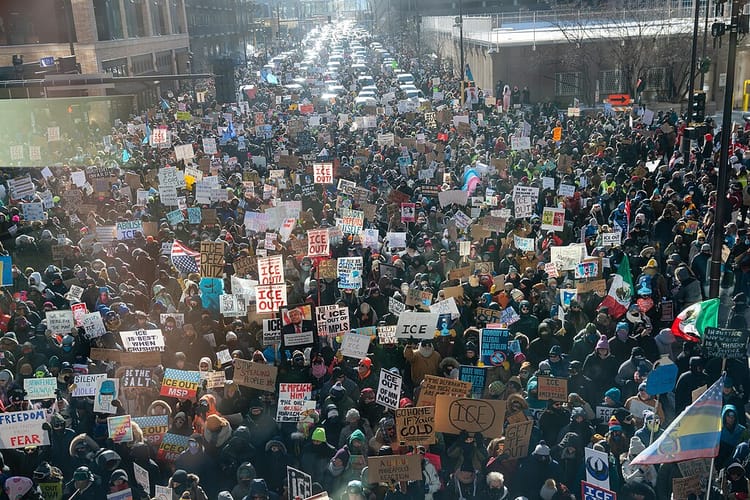How LNG Exports Threaten Energy Security

In the wake of the Biden Administration's announcement that it will temporarily pause approvals of new liquefied natural gas (LNG) export terminals, Mike Sommers, president of the American Petroleum Institute, has shown up on everything from Fox News to MSNBC warning that this minimal step—which is both temporary and only affects new export terminals, not operational terminals or those already permitted—will bring with it not only a spike in prices for American consumers but a major threat to energy security is the latest version of the industry’s oldest story, the one it returns to time and again. There are lots of variations on it, but the gist is basically: American fossil fuel production keeps America safe and bills affordable.
It’s extremely effective because, like all good propaganda, there’s a kernel of truth to it. Domestic energy sources do increase security and prosperity. But for this narrative to work today it has to ignore the fact that renewable energy is also a domestic source, that this particular energy source comes with more danger than security given its climate impacts, and that exports mess with the energy security math considerably. It's particularly bizarre as a way to talk about the impact of Liquefied Natural Gas (LNG) export terminals. In fact the increase in the volume of LNG being exported from the U.S. since the export ban was lifted in 2015 (on the heels of relentless lobbying from the industry, which was desperate to turn the fracking glut into profit) has made energy availability and pricing more volatile for Americans.
It’s clear in the data. When the Freeport LNG plant in Texas exploded, for example, gas prices shot up overseas but they dropped domestically because all of a sudden that big chunk of gas that would normally have been exported from Freeport was suddenly available domestically. Alternatively, when winter storms take regional LNG plants offline and freeze wellheads driving domestic production down unexpectedly, domestic prices spike dramatically because there’s no readily available replacement thanks both to the country's reliance on gas and to the industry’s focus on more profitable exports over domestic energy security.
Whenever media covers a slowdown of fossil fuel development as a "win for climate activists," it's annoying and inaccurate. But in this case it's particularly so because the instability in the energy market caused by the industry's focus on LNG exports creates problems for every American. A story that’s gone largely unreported in the coverage of the LNG pause, for example, is the fact that manufacturers have been asking the Biden administration to rein in gas exports for years. The Industrial Energy Consumers of America (IECA), which represents manufacturing companies with $1.1 trillion in annual sales and over 12,000 facilities nationwide, argued in 2023 that the administration was "protecting LNG exports at the expense of American consumers." These are industrial manufacturers, folks, not the Sierra Club.
“As LNG exports increase, so do reliability and price risks for the natural gas and electricity markets,” they wrote in January 2024. “Natural gas reliability directly impacts electricity reliability and prices. Energy reliability has significant human safety, economic, supply chain, and domestic national security implications. It is ironic that while LNG exports decrease U.S. consumers’ reliability, it gives LNG buying countries guaranteed access and reliability of natural gas under contracts for as long as 20 years.”
This is one entry in the just-published Drilled 2024 Guide to Climate Disinformation. We'll be updating it regularly, so if you've got a tip, send it over!
This week on the podcast: How the Department of Homeland Security's ever-widening definition of ecoterrorist fed into massive police over-reach and the murder of an activist during the #StopCopCity protests in Atlanta.
This Week's Climate Must-Reads
- Why Your Company Probably Shouldn't Call Itself Climate-Positive (by Adele Peters for Fast Company) - H&M walking back its climate commitments may actually be a good thing if it means they're targeting, and measuring, real emissions reductions.
- EU leaders pledge more concessions to appease angry farmers (by Alice Hancock, Andy Bounds, and Adrienne Klasa for the Financial Times). Fascinating to contrast reaction to farmers protests & their tactics (shutting down roads, piling up or throwing manure) to the reaction to climate protest. Where are all the big think pieces on whether this tactic "works"? No need, because politicians are caving almost instantly.
- Why carbon capture isn't a magic bullet solution to climate change (Marketplace Tech - audio) - Former Canadian environment minister Catherine McKenna breaks down all the reasons we shouldn't be relying on carbon capture as a climate solution.
- A Year Later, the Stream Flowing Below People's Homes in East Palestine Is Still Polluted (Reid Frazier, The Allgheny Front) - There were lots of East Palestine anniversary stories this week, but on a local story that gains national significance...always stick with the local reporters! The Allegheny Front does excellent work on everything happening in Ohio and Pennsylvania and its coverage of East Palestine is no exception.
- Panama Canal Drought Causes Global Disruptions (by Stephanie Sy and Karina Cuevas for PBS Newshour) - There's a steady stream of fascinating news coming out of Panama these days, first the closure of a copper mine due to environmental concerns and now the Panama Canal is giving the world a preview of just how destabilizing climate change will be.





